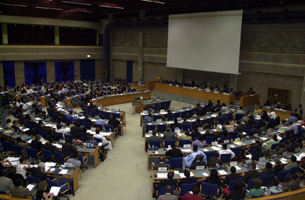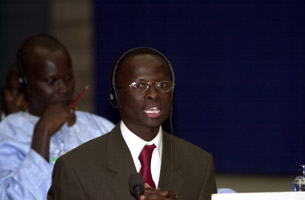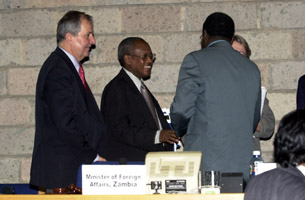|
The
World Summit on Sustainable Development African Preparatory Meeting 15 - 18 October 2001 Nairobi, Kenya |
|||
|
|
||||
|
|
||
| PLENARY: | ||
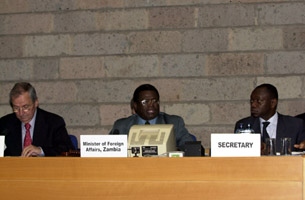 Chair
Walubita (Zambia) opened the
Plenary later than scheduled and apologized for the delay that was caused
by recent events at the Nairobi UN complex. UNEP Executive Director Klaus
Töpfer updated delegates on news of the potential anthrax threat at the
UN Office. Left photo (L-R): The dias during the morning plenary included
Klaus Töpfer, Chair Keli Walubita, and Sekou Toure Chair
Walubita (Zambia) opened the
Plenary later than scheduled and apologized for the delay that was caused
by recent events at the Nairobi UN complex. UNEP Executive Director Klaus
Töpfer updated delegates on news of the potential anthrax threat at the
UN Office. Left photo (L-R): The dias during the morning plenary included
Klaus Töpfer, Chair Keli Walubita, and Sekou Toure |
||
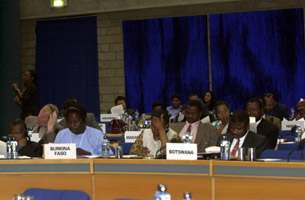 During
the morning Plenary and first half of the afternoon Plenary, delegates
considered the draft African Ministerial Statement. Many minor amendments
were made, as well as a number of new proposals constituting substantive
changes. In concluding discussion on this item, Chair Walubita said revised
and translated text would be considered later in the afternoon when adopting
the final documents. Left photo: Delegates reading the draft ministerial
statement during the morning plenary During
the morning Plenary and first half of the afternoon Plenary, delegates
considered the draft African Ministerial Statement. Many minor amendments
were made, as well as a number of new proposals constituting substantive
changes. In concluding discussion on this item, Chair Walubita said revised
and translated text would be considered later in the afternoon when adopting
the final documents. Left photo: Delegates reading the draft ministerial
statement during the morning plenary |
||
|
|
||
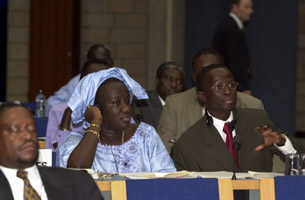 On the agenda item on strategic discussion, way forward and plan of action, there was limited deliberation, with Senegal (left) urging the involvement of youth, Burkina Faso requesting more information on this important topic and, with Tunisia, urging consideration of the next steps and the setting of a calendar. |
||
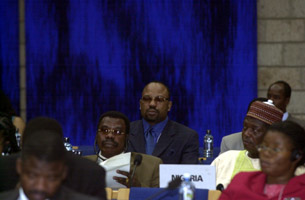 Nigeria
(right) shared his knowledge of the process, clarified the opportunities for
input and explained the preparatory process meetings, stating that all
regional statements will be considered at the January 2002 Preparatory
Session in NY, where themes will be selected to frame the WSSD, after which
time it will be difficult to add anything to the agenda. Nigeria
(right) shared his knowledge of the process, clarified the opportunities for
input and explained the preparatory process meetings, stating that all
regional statements will be considered at the January 2002 Preparatory
Session in NY, where themes will be selected to frame the WSSD, after which
time it will be difficult to add anything to the agenda. |
||
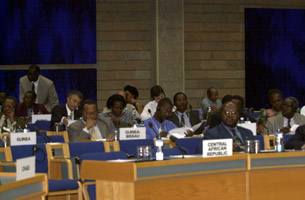 Regarding
the adoption of final documents, delegates considered the revised draft
Ministerial Statement (K0128108 Regarding
the adoption of final documents, delegates considered the revised draft
Ministerial Statement (K0128108 |
||
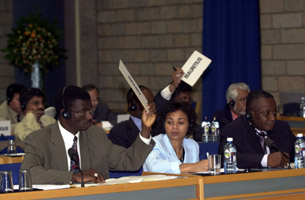 Delegates
also considered the report of the Ministerial Segment (UNEP/(ROA)/WSSD/1/L.2).
Regarding the presentation of reports of key preparatory meetings, Senegal
proposed, and delegates adopted, a provision encouraging the organization of
a forum for youth, and said Dakar, Senegal, would be an appropriate place to
host such a forum, taking into account that Senegal has a Ministry of Youth
and the Environment. Stating that it was still supportive of the Ministerial
Statement, Libya said it should be noted that the Arabic version of the
Statement was not available when this item was considered. The report was
adopted. Left photo: Delegates from Benin and Mauritius raising their sign
to signal their intention to intervene. Delegates
also considered the report of the Ministerial Segment (UNEP/(ROA)/WSSD/1/L.2).
Regarding the presentation of reports of key preparatory meetings, Senegal
proposed, and delegates adopted, a provision encouraging the organization of
a forum for youth, and said Dakar, Senegal, would be an appropriate place to
host such a forum, taking into account that Senegal has a Ministry of Youth
and the Environment. Stating that it was still supportive of the Ministerial
Statement, Libya said it should be noted that the Arabic version of the
Statement was not available when this item was considered. The report was
adopted. Left photo: Delegates from Benin and Mauritius raising their sign
to signal their intention to intervene. |
||
| CLOSING CEREMONY: | ||
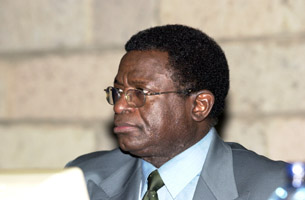 Chair
Walubita (right) convened the Ceremony and invited Kenya's Assistant
Minister in the Ministry of Environment and Natural Resources, Stephen ole
Ntutu, to make a statement. Chair
Walubita (right) convened the Ceremony and invited Kenya's Assistant
Minister in the Ministry of Environment and Natural Resources, Stephen ole
Ntutu, to make a statement.
|
||
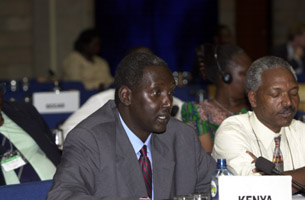 |
||
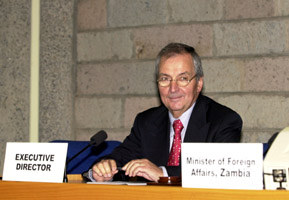 |
||
|
|
||
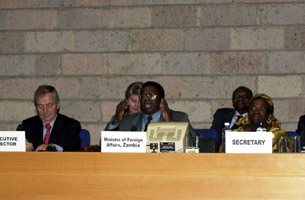 |
||
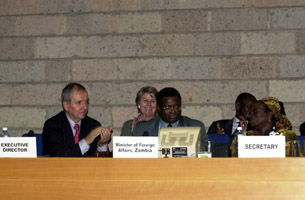
|
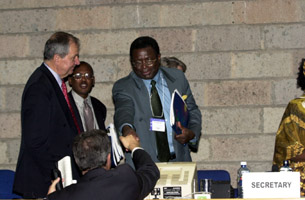
|
|
| With a call for long live Africa, long live the New African Initiative, Chair Walubita called the Segment to a close at 8:36pm. | ||
|
|
|
|
| © 2001, IISD. All rights reserved. |
|
|


